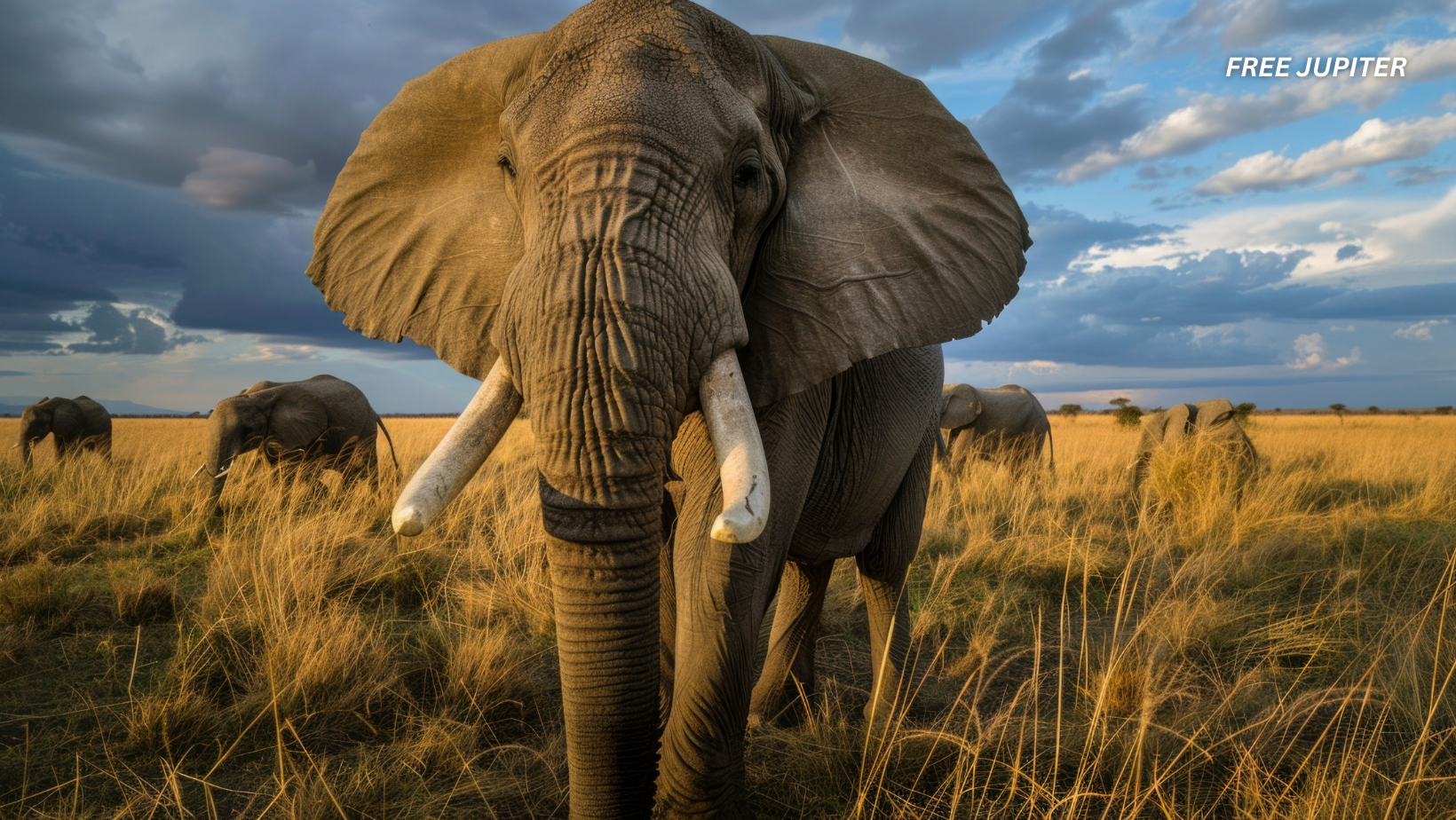Friendly Note: FreeJupiter.com shares general info for curious minds 🌟 Please fact-check all claims—and always check health matters with a professional 💙
Imagine driving on a dusty road, the hum of your car the only sound around you, when suddenly a giant shadow moves across the path. Then another. And another. Before you realize what’s happening, a parade of elephants—majestic, calm, and commanding—begins to cross right in front of you.
Of course, you stop. Not just because it would be reckless not to, but because how often do you get to witness one of the most awe-inspiring scenes nature has to offer? Recently, a video captured exactly this moment: a herd of elephants calmly making their way across a road while patient drivers watched in respectful silence.
But it wasn’t the crossing itself that left viewers around the world stunned. It was what happened at the very end. After the last calf had hurried across, the herd’s leader—a wise, wrinkled matriarch—paused. She turned toward the cars, lifted her trunk in the air, and gave what looked uncannily like a gesture of thanks.
In that split second, an ordinary roadside delay became something extraordinary: a reminder that respect can bridge even the widest gap between species.
The Social Order of Elephant Herds
To understand why this moment resonates so deeply, you need to know a little about how elephant families work. Unlike many animals, elephants live in highly organized social groups. A herd isn’t just a loose gathering—it’s a family, and like most families, it has a clear leader.
That leader is almost always the matriarch: the oldest and most experienced female. Her authority isn’t based on brute strength, but on wisdom. She remembers where the watering holes are during droughts, which paths are safest during migration, and how to steer her herd away from danger. When she moves, the others follow.
A typical herd is made up of mothers, daughters, aunts, cousins, and their young. Calves don’t belong to just one mother—they’re cared for by everyone. If a baby stumbles or cries out, several adults rush to comfort and protect it. Scientists call this “allomothering,” but to put it more simply: elephants babysit each other’s kids.
Males, however, eventually leave the herd as they grow older. Around adolescence, young bulls venture off to live alone or form small bachelor groups. The main family unit, however, remains tightly bonded through shared responsibility and constant communication—through trumpets, gentle rumbles, physical touches, and even seismic vibrations in the ground that only elephants can detect.
Read more: New Study Shows Elephants Have Been Attempting to Communicate With Us For Years
Elephants and the Language of Respect
Perhaps the most fascinating thing about elephants is that they don’t just live together—they live with rules, traditions, and etiquette. Respect is woven into their society. Young elephants are expected to greet their elders, often by touching trunks, rumbling softly, or simply acknowledging them before going about their day.
Elders hold a special place within the herd. They’re not just tolerated—they’re revered. An older female who is not the matriarch may still command deep respect, while senior bulls, though often solitary, carry weight in elephant society. Much like in human communities, knowledge and age earn admiration.
This culture of respect could explain why the matriarch in the viral video seemed to “thank” the humans. While scientists are cautious about attributing human emotions to animals, there’s no denying that elephants are capable of recognition, gratitude, and even ceremony.
Stories of Elephant Intelligence and Gratitude
The roadside “thank you” isn’t the first time elephants have left people marveling at their social intelligence. Across the globe, there are countless stories of elephants expressing what looks like gratitude, mourning, or acknowledgment in ways that feel almost human.
- The Mourning Rituals of Elephants
Elephants are famous for their funerary behaviors. When one of their own dies, herds often gather around the body. They may gently touch the bones with their trunks, stand in silence, or remain nearby for days. Researchers have observed elephants returning to the remains of their kin years later, as though paying their respects. - The Farmer’s Funeral in India
In 2016, an extraordinary story spread from a small village in India. A man known for protecting local elephants passed away. To the shock of villagers, a group of elephants appeared at his funeral, standing silently near his home as if saying goodbye. Whether coincidence or something deeper, the moment captured the uncanny depth of elephant memory and connection. - The Rescued Elephant Herd
In Thailand, elephants at a sanctuary have been known to express gratitude in their own ways. One well-documented case involves a blind elephant named Jokia who was rescued from abusive logging work. Other elephants in the sanctuary formed a protective circle around her, guiding her safely to food and water. Caretakers noted how the herd seemed to “understand” her condition and took on the role of guardians. - The Kenyan Road Crossing
Similar to the recent viral video, drivers in Kenya’s Amboseli National Park once paused to let a herd cross. The matriarch not only stopped to acknowledge the vehicles but actually walked halfway back toward them before turning around—almost like she was making sure the humans knew she appreciated their patience.
These stories highlight a truth many scientists cautiously agree on: elephants may not only recognize kindness, but also respond to it in ways that mirror human gratitude.
The Human-Elephant Relationship
For centuries, humans and elephants have had a complicated relationship—one that includes awe, reverence, conflict, and sometimes tragedy. Elephants are revered in many cultures. In Hinduism, the elephant-headed god Ganesha represents wisdom, luck, and new beginnings. In Africa, elephants are seen as symbols of strength and family unity.
Yet, elephants have also been victims of poaching, habitat loss, and human expansion. Road crossings, like the one in the viral video, highlight just how much their survival now depends on human behavior. A single impatient driver could cause chaos or harm. Instead, patience and respect can create moments where two very different species meet in harmony.
Conservationists argue that encounters like these are not just charming anecdotes—they’re essential reminders of why protecting elephants matters. These animals live long lives (up to 70 years), form intricate social bonds, and pass down knowledge across generations. Losing even one matriarch to poaching or human conflict can disrupt an entire herd for decades.
Why This Matters More Than Ever
The “thank you” wave might look small, but its significance is big. In a time when wildlife faces increasing challenges, it’s a symbol of what’s possible when humans and animals share respect. Elephants are not just majestic creatures—they’re living reminders of intelligence, cooperation, and empathy beyond the human species.
The matriarch’s gesture was more than a charming quirk. It was a quiet invitation: a reminder that we’re not just observers of the natural world, but participants in it. Our patience, choices, and respect ripple outward, shaping the survival of species that have walked the Earth far longer than we have.
Read more: Scientists Finally Reveal How Cats Navigate Home Over Super Long Distances
A Lasting Impression
For the lucky people who sat in their cars that day, waiting as a family of elephants made their careful crossing, the memory will likely never fade. They didn’t just see a herd pass by; they witnessed a moment of connection.
And for the rest of us, watching from our screens, the scene carries a lesson wrapped in silence: sometimes, the most powerful thank-you doesn’t come in words. It comes in the lift of a trunk, the pause of an elder, and the unspoken bond between beings who understand, in their own way, the importance of respect.










